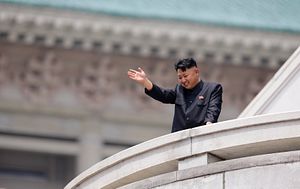Rampant speculation that Kim Jong-un is seriously ill or facing a possible coup is misguided, according to Eurasia Group, a political risk consultancy.
In recent days, Kim Jong-un’s over month-long public absence has sparked speculation that he may be facing a life-threatening illness or, alternatively, may have been ousted from power. This speculation has grown especially intense since Hwang Pyong-so, Choe Ryong-hae, and Kim Yang-gon made their surprise visit to South Korea on Saturday.
However, in a research note sent out on Monday, Eurasia Group deemed it “highly unlikely” that either Kim’s public absence or the surprise trip signaled “any kind of regime change in the North,” as many have been speculating.
In fact, Eurasia Group asserted that the very fact that Hwang and Choe traveled to South Korea on Saturday should be taken as proof that Kim Jong-un’s health and grip on power are not at serious risk. “There is little chance that these individuals… would leave the country if Kim were either seriously ill or if there were factional infighting going on,” Sue Terry and Nicholas Consonery, Asia analysts at Eurasia Group and the co-authors of the note, wrote. Hwang and Choe are widely assumed to be North Korea’s second and third most powerful officials respectively.
Consequently, Terry and Consonery believe that Kim Jong-un’s failure to appear in public over the past month is most likely due to some kind of non-serious health problem. This is consistent with the explanation offered by North Korea’s state media, which said that Kim is dealing with “discomfort.”
On the other hand, Terry and Consonery believe the the surprise trip over the weekend was primarily driven by economic considerations. Specifically, they argue that the trip was made to reinvigorate Pyongyang’s long-standing efforts to get South Korea to lift the severe trade restrictions it put in place following the North’s sinking of the South Korean patrol vessel, the Cheonan, in 2010. These sanctions suspended all bilateral trade between the two Koreas — which at the time was worth nearly $2 billion annually — with the sole exception of the Kaesong Industrial Complex. As this blog has followed closely, South Korean officials have signaled a greater willingness to lift these sanctions in recent months, which might have motivated Pyongyang to send such a senior delegation to South Korea, if this indeed was the purpose of the trip.
Terry and Consonery also believe that a secondary goal of the trip for the North was to pull South Korea closer as Pyongyang’s relationship with China continues to deteriorate. This interpretation is consistent with the DPRK’s past behavior; Pyongyang has a long history of mounting charm offensives towards rivals each time its relationship with its principal patron — China or the Soviet Union before it — deteriorates.
For more on the Kim Jong-un situation and recent inter-Korean diplomacy, check out this week’s podcast here.
































